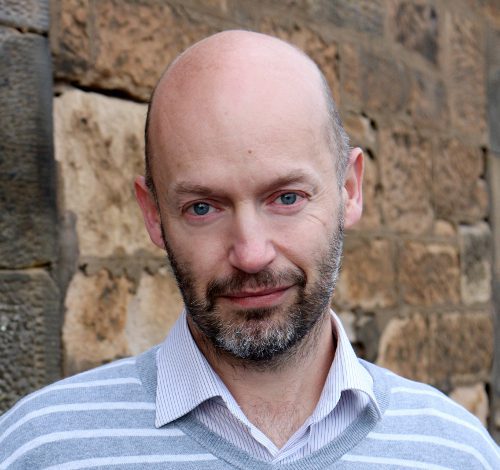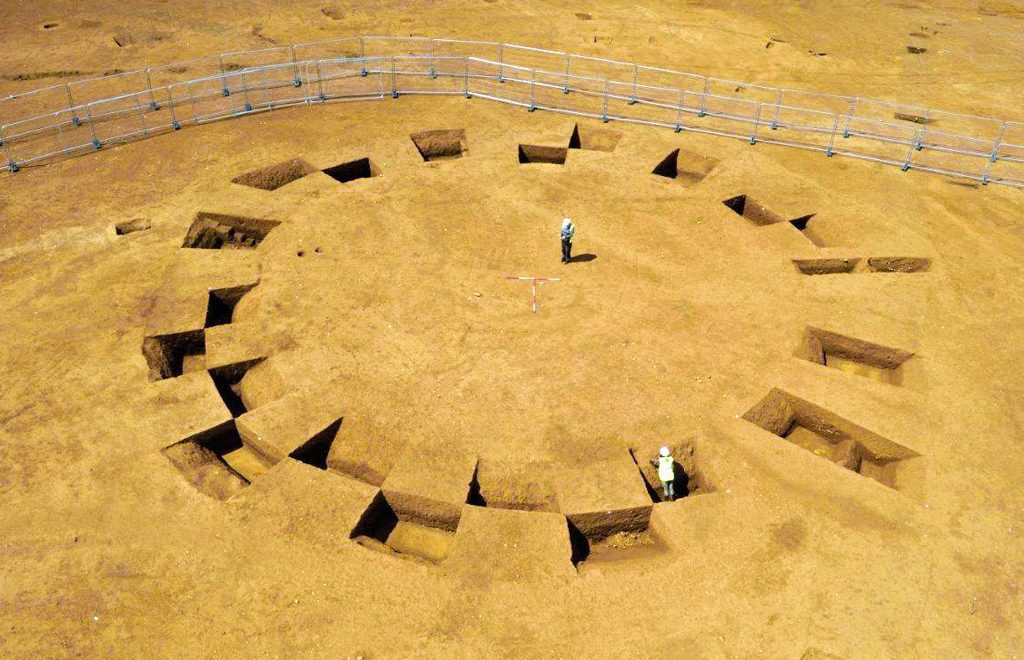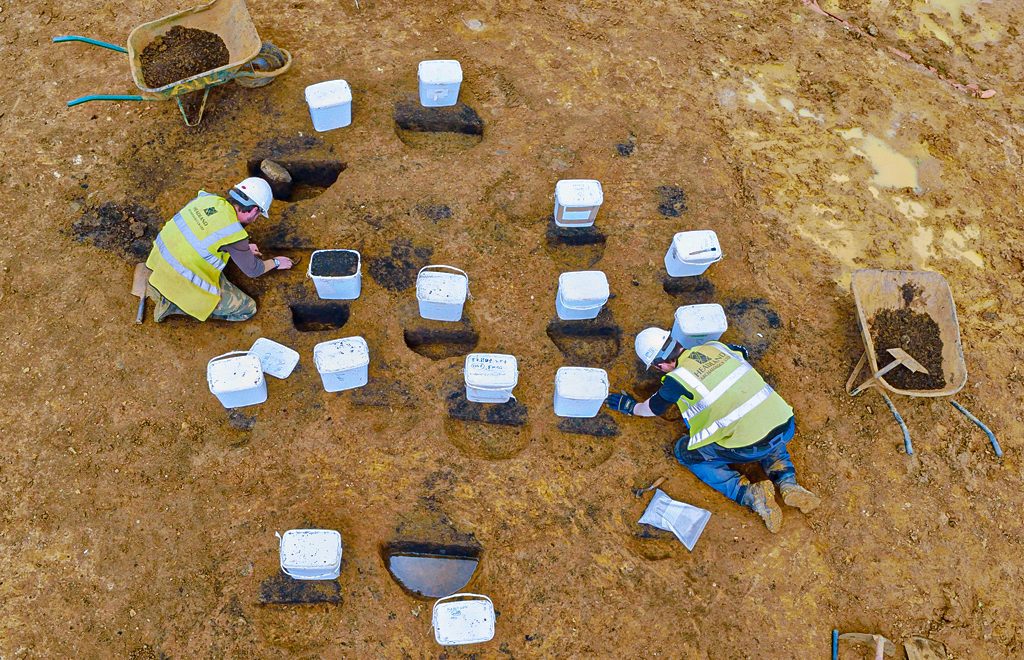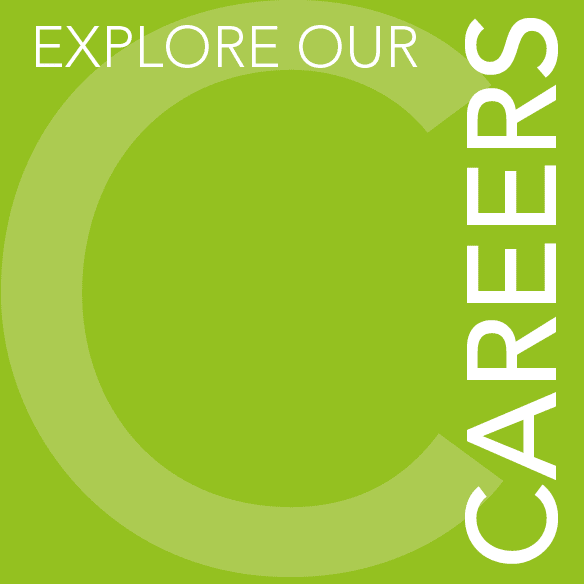A day in the life: Archaeologist Dr Alex Smith
Published on March 30, 2023Dr Alex Smith is head of post-excavation at Headland Archaeology, an RSK Group company, which is a specialist commercial archaeology business based in the UK and is home to experts across a wide range of disciplines from excavation to geophysical surveying and data management. Since joining the company in 2017, Alex has worked to expand the post-excavation section to what is now a 31-member-strong team, as well as managing a range of projects that have revealed fascinating discoveries.

“As head of post-excavation, I have responsibility for managing the overall completion as well as the specialist areas of post-excavation work, including research, finds, archives, graphics and environmental work across all our five offices. I have spent the past five years growing our division, which now has five departments responsible for a range of operations.”
“Our team provides expert opinion on a wide range of more technical areas, such as palaeoenvironmental analysis (the study of the environment in the geological past), osteoarchaeology (the study of bones), graphics and finds analysis. Our work spans all stages of an archaeological project and ultimately ensures that the reports are submitted on time, to budget and to a high standard. The projects we undertake are very diverse, and we specialise in large infrastructure, like the A14 road scheme in Cambridgeshire, which is one of the largest archaeological projects ever undertaken in the UK.”
In his work at the post-excavation team, Alex’s days are varied and often begin with an early morning walk.
“My typical day starts with an early morning walk with the dogs at my home in the highlands of Scotland, sometimes in the winter snow! The day will then usually progress with meetings, although these are mostly undertaken via Teams these days. These meetings will be with department heads to go through work programmes and review projects, while others may be with clients, discussing project progress or commenting on post-excavation in a consultancy capacity. Many of our large infrastructure projects involve working in partnership with other organisations, including other archaeological contractors, so a fair share of my time can be spent liaising with our partners and helping to cement solid working relationships – it’s an important aspect of our work.
“With a rapidly growing team and increasing numbers of projects, it often feels as though there is not enough time in the day! Careful time management is key: I have a structured work planner for each week and try to keep one day as free as possible so there is uninterrupted time for other tasks that might otherwise get swamped by the general day-to-day work.”
Though Alex is leading a busy department, he has opportunities to return to research, where his passion for archaeology started.
“I still get to dabble in archaeological research, which is where my career started. Prior to working with Headland, I spent six years as a post-doctoral research fellow at the University of Reading. My current research revolves around some of the amazing discoveries our field teams have unearthed, which include Roman villas and unusual burials. This certainly helps to keep me connected with my passion for archaeology!”
I love archaeology, and working for a large commercial archaeology company like Headland means I can be at the forefront of new discoveries and new research. Over the past five years, I have helped to develop a wonderful team of specialists, researchers, technicians and illustrators who have worked on these discoveries and whose enthusiasm and drive make this a great place to work.
In addition to the joy of working in a profession he is so passionate about, Alex enjoys the diversity of project work the team undertakes.
“I particularly enjoy the management of large, collaborative infrastructure projects like the A14 in Cambridgeshire, which give us the chance to put exciting innovative techniques into practice. These opportunities enable us to address new research questions and explore multiple publication outputs. Gone are the days when the end result of a major excavation comprised a single hefty monograph with limited appeal beyond the profession – we now produce a range of outputs for different audiences, including podcasts, school packs and interactive digital story maps. Our large projects have helped us foster closer links with universities: in the case of the A14, we created an academic panel and a number of masters studentships, which have helped the project, the university and the archaeological sector by inspiring the next generation of specialists.”
In recent years too, the value archaeology brings to development and planning work is being increasingly recognised.
“In the UK, archaeology has been an integral part of the planning system since the early 1990s, to manage the impacts that development may have upon the historic environment. Companies like Headland now play a key role in ensuring the successful delivery of construction projects by working with developers to mitigate these impacts. Overall, development-led archaeology has created significant value in terms of a direct contribution to the economy by revenue generation and employability. There are also tangible benefits for developers in terms of associations with outreach programmes that can bring significant positive public benefit and awareness.”
Looking ahead to the future, there are many exciting opportunities ahead for Alex and his team.
“At Headland and across the industry, there is a notable shortage of specialists who can work on the kind of projects we do. In order to tackle this, we have a number of staff undertaking formal specialist training. The company has undergone significant growth and change in the five years I have been working here, in no small way stimulated by its inclusion within the much larger RSK family. We now have an experienced and motivated core staff in different sections and departments across the UK, all of which are striving to work together. The future looks to hold further sustainable growth on the back of an expanding client base in sectors from housing to renewables and major transport infrastructure.
“Yet it is not just growth that excites me, but the opportunities to build upon our already strong culture of innovation and develop further, deeper ties with academic institutions in order to help break down the still significant barriers between the commercial and academic sectors.”
The Sustainability Committee from @pensarinfrastructure recently planted 60 saplings of varying native species including a selection of eucalyptus.
We look forward to seeing how this project progresses!
Keep up the brilliant work Pensar. 👏
#RSKGroup #SelfiesOnSite #Eucalyptus #TreePlanting #Sustainability
Join our latest First Thursday Club webinar, Climate risk and TCFD: navigating the waters of a changing climate.
Join our expert speaker Dr Libby Robinson to explore:
🍃The basics of a climate change risk assessment
🍃The process and benefits of conducting a climate change risk assessment
🍃How companies can embed this thinking into their strategic planning
🍃The recommendations of the Task Force on Climate-Related Financial Disclosures (TCFD)
➡️ Follow the link in bio to register!
#RSKGroup #ClimateRisk #TCFD #ClimateChange
Have you ever wondered what it`s like to be a Specialist Water Engineer?
We recently spoke to Laura Casas Cardona to hear more about her passion for using innovation to tackle environmental and social challenges and how this drives her work at RSK Group company ABM Consulting.
Outside of work, Laura dedicates her time to Engineers Without Borders. Made up of professionals, teachers and students, the group works to guarantee universal access to basic services.
Would you like to learn more about Laura`s passion for innovation?
Follow the link in bio or save this post for later!
#RSKGroup #WaterEngineer #Engineering #Innovation #EngineersWithoutBorders
Graduate Environmental Consultants from RSK Middle East have recently been on-site in AlUla.
Rajshree and Dounia have been busy conducting site reconnaissance, terrestrial ecology surveys and landscape and visual amenity surveys for multiple projects.
Are you interested in a career with RSK?
Like and follow us for more!
#RSKGroup #SelfiesOnSite #Careers
We have recently partnered with the Centre for Technology Excellence Sarawak (CENTEXS) in Malaysia.
The collaboration involves working on a range of sustainability projects with the Sarawak Government, drawing on the RSK Group network of environmental and engineering professionals.
Dodi Mohammad, of Tradisi Busana PR, has developed a course that draws inspiration from world-renowned designer Prof Datuk (Dr) Jimmy Choo OBE, with the curriculum personally approved by the shoe maestro.
CENTEXS will pilot a sustainability module within this course, supported by RSK`s global sustainability expertise.
➡️ Follow us to find out more about the projects we are working on.
#RSKGroup #Sustainability #JimmyChoo #ShoeMaking #SustainableDesign
RSK is proud to have recently launched its newest employee network.
The RSK Accessibility Network was launched in May and, has a clear focus on helping to develop progressive policies while providing a supportive space for people with a disability or those with a disabled family member.
Chairing the network will be Binnies Asset Management Consultant Cambell Plant and Ecologia Environmental Project and Technical Coordinator Stephen Watkins.
Swipe to read their thoughts now ➡️
#RSKGroup #Accessibility #CompanyCulture #LifeAtRSK
Join us for our latest The Blue Thread webinar, Flowing forward: Exploring 21st century water solutions
📅 21st May
⏰ 12:30 pm BST
This webinar will delve into critical topics such as flood management, process solutions, and the cutting-edge technology shaping our water systems.
➡️ Swipe to find out what you can learn from this webinar.
Follow the link in bio to register
#RSKGroup #WaterSector #FloodManagement #WaterResources #WaterTechnology









